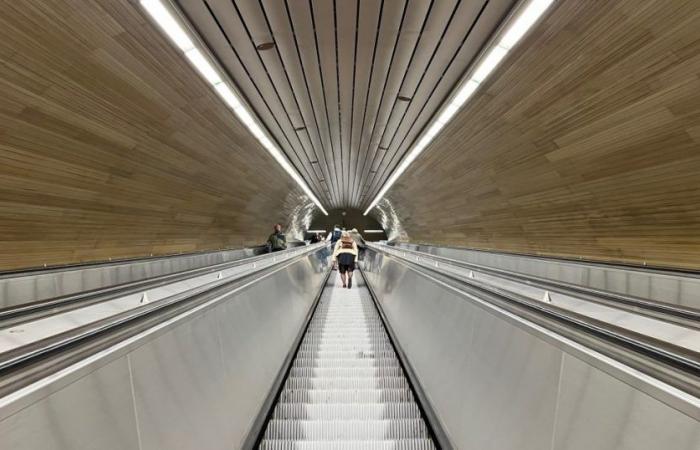Emptiness is openness. When we empty the space of the mind, we open it up, we make it available – for example, to new thoughts. In the physical environment, being in a emptier space means that we have a better perception of everything else in it. To greater nuances, deeper, in more obvious contexts. There is so-called no movement in the filled space. Everything remains still, there is no room for change, for movement. Things shout over each other and paradoxically cancel each other out.
One of the current examples, which appeared rather by the magic of the unwanted, are the recently reconstructed escalators in the metro station Náměstí Jiřího z Poděbrady. After all, when it opened a few months ago, there were suddenly no advertising boards on the walls, which before that covered the entire length of the tube. The emptiness, perhaps unexpectedly for many of us, showed the pure beauty of the space – the shape of the tube, the structure of the paneling, the diffused light. And people began to praise the Transport Company for taking such a step. However, then it turned out that this was not the intention, that he just did not have time to return the ads. And thanks to this, (unverified) information appeared that he receives about 116,000 crowns per year for them. Which caused a wave of initiatives on social networks, where people would rather pay such an amount to keep the escalators without ads. The result is not yet clear, however, if the Transport Company decided not to return the ads based on people’s reaction, it would be a nice precedent in one more respect. In the beginning, there was no offensive, negative criticism, but instead praise.
I would like to give one more example – of a different scale. Namely, the decision to leave out and preserve in the otherwise dense grid an empty rectangle of 4000 x 800 m – today’s Central Park – during the creation of the urban design of Manhattan. It was, I think, the greatest urban planning service to the city of New York in its entire history.
Perfect simplicity
Wim Wenders’s film Perfect Days was recently shown in Czech cinemas. Personally, I cannot perceive it as a Japanese reality (here I recommend watching the documentary film A Japanese Story of Love and Hate, which shows a similar theme in a non-idealized way), but if we look at Wenders’ film as a metaphorical fairy tale, we can take away a valuable message.
The protagonist of Perfect Days is Mr. Hirayama (Koji Yakusho), a toilet attendant in the public toilets of the Japanese capital|photo:Aerofilms
Here we see the daily life of Hirajama, who is determined to keep his life to a minimum and thus enjoy the ordinary, subtle beauty of the everyday that is available to everyone. Observing the movement of leaves in the crowns of trees, but perhaps also carrying out an ordinary existence routine. And among other things, almost in the form of instructions, we also see that a condition for appreciating such subtleties is also the purification of the living space from all superfluous material scenery and props.






